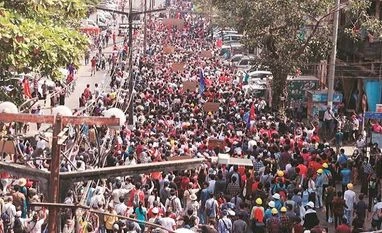UN Security Council calls for reversal of Myanmar coup, condemns violence
The UN Security Council unanimously called for a reversal of the military coup in Myanmar, strongly condemning violence against peaceful protesters and calling for "utmost restraint" by the military
)
Protesters rally against the military, marching towards the Sule Pagoda in Yangon
The UN Security Council unanimously called for a reversal of the military coup in Myanmar on Wednesday, strongly condemning the violence against peaceful protesters and calling for "utmost restraint" by the military.
A presidential statement approved by all 15 council members including Myanmar's neighbor and friend China was formally adopted at a very brief virtual meeting where US Ambassador Linda Thomas-Greenfield, the current council president, announced that the statement had been agreed.
A presidential statement is a step below a resolution but becomes part of the official record of the UN's most powerful body.
The British-drafted statement calls for the immediate release of government leaders including State Counsellor Aung San Suu Kyi and President Win Myint who have been detained since their ouster in the February 1 military coup.
It supports the country's democratic transition and "stresses the need to uphold democratic institutions and processes, refrain from violence, fully respect human rights and fundamental freedoms and uphold the rule of law."
China's UN Ambassador Zhang Jun said in a statement that "it is important the council members speak in one voice," and declared that it's now time for de-escalation, diplomacy and dialogue.
Also Read
Thomas-Greenfield also stressed that all council members "spoke with one voice to condemn the ongoing violence against peaceful protesters."
"We commend their courage and determination in the face of continued, brutal attacks by military and security forces," she said in a statement. "The United States will continue to work with a broad coalition of international partners to promote accountability for the coup and those responsible for violence, and will work to restore the democratically-elected government."
The coup reversed years of slow progress toward democracy in Myanmar, which for five decades had languished under strict military rule that led to international isolation and sanctions. As the generals loosened their grip, culminating in Suu Kyi's rise to power after 2015 elections, the international community responded by lifting most sanctions and pouring investment into the country.
Lawmakers from Suu Kyi's party, which won 82 per cent of the vote in November elections, were about to take their seats in parliament when the coup took place on February 1. Its leaders claimed electoral fraud, allegations the electoral commission had rejected.
Britain's UN Ambassador Barbara Woodward said the United Kingdom proposed the statement in light of "the deteriorating situation in Myanmar to send a unified message from the Security Council" to build on its February 4 press statement. It strongly backed a return to democracy and called for the immediate release of Suu Kyi and all those arbitrarily detained by the military.
Opposition to the coup is being spearheaded by young people who lived in freedom for 10 years, and it has wide support throughout the country from civil servants, railway workers who were targeted Wednesday, Buddhist monks, and people of all classes and ages.
Security forces have responded with mass arrests and at times lethal force. At least 60 protesters have been killed since the military takeover, according to the independent Assistance Association for Political Prisoners.
Authorities have also moved to shut down independent reporting, both through arrests of journalists and the closure of media outlets -- but the protests have continued despite the crackdowns and increasingly violent tactics of security forces.
The presidential statement which all council members signed on to Wednesday is weaker than the initial draft circulated by the United Kingdom which would have condemned the military coup in Myanmar and threatened "possible measures under the UN Charter" -- UN language for sanctions -- "should the situation deteriorate further."
Diplomats said council members China, Russia, India, which is also a neighbor of Myanmar, and Vietnam, which is a member of the 10-nations Association of Southeast Asian Nations known as ASEAN, along with Myanmar, objected to provisions in stronger earlier drafts of the statement.
Nonetheless, it will be the first presidential statement on Myanmar adopted since 2017 and reflects council unity in trying to reverse the coup.
UN Secretary-General Antonio Guterres expressed hope the statement will make the military realize "that it is absolutely essential to release all prisoners, it is absolutely essential to respect the results of the elections, and to allow for a situation in which we move back to a democratic transition."
Despite all the "imperfections" in Myanmar's democracy, which was under heavy military control, Guterres told reporters "I believe that it is important to go back to where we were before the coup."
The council statement also addressed the military crackdown in 2017 against Rohingya Muslims in Rakhine State involving mass rape, murders and the torching of villages that led more than 700,000 Rohingya to flee to neighboring Bangladesh.
It "highlights that the current situation has the potential to exacerbate existing challenges in Rakhine state and other regions."
The statement also expresses concern that recent developments pose particular serious challenges for the voluntary, safe, dignified, and sustainable return of Rohingya refugees and internally displaced persons."
"It is vital that the rights of minorities are fully protected," it stressed.
(Only the headline and picture of this report may have been reworked by the Business Standard staff; the rest of the content is auto-generated from a syndicated feed.)
More From This Section
Don't miss the most important news and views of the day. Get them on our Telegram channel
First Published: Mar 11 2021 | 7:04 AM IST
